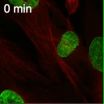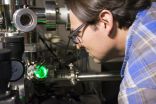'Rambo' protein may not be so violent after all
Researchers discover protein falsely accused of violence actually protects against heart failure
2015-07-06
(Press-News.org) A protein dubbed 'Bcl-Rambo' can protect against heart failure, suggests new research from King's College London and funded by the British Heart Foundation (BHF).
The Bcl-Rambo protein (also known as Bcl2-L-13) was named by a Japanese scientist because it was thought to be involved in activating cell death - 'Rambo' also means violence in Japanese. However, it seems that the Rambo movie character's protein counterpart has actually been misjudged. New research shows for the first time that the Bcl-Rambo protein may not be so violent after all and is actually involved in an essential and protective process which is implicated in heart failure.
Controlled regulation of this protein may help to limit the development of heart failure. The research, published in the Nature Communications journal today, will open doors for scientists to develop new therapies to improve the outlook for people suffering with heart failure, a condition for which there is currently no cure.
There are around 175,000 heart attacks in the UK each year - one every three minutes. For those who survive a heart attack there is a risk that the heart will have been damaged and this can lead to heart failure. Over half a million people in the UK are living with heart failure. It can have a huge impact on a person's life, leaving them tired, short of breath and unable to do everyday activities like walking up stairs or washing by themselves.
The BHF-funded researchers, working with colleagues in Japan on cells derived from humans and mice, discovered the Rambo protein is involved in safely clearing damaged mitochondria from cells. Mitochondria are small structures within cells which are often referred to as their powerhouses. They produce vital energy needed for cells to work properly. Damaged mitochondria are removed by a process called mitophagy - killer vesicles are activated to engulf and degrade the damaged mitochondria. The process of mitophagy is essential, and mistakes in this process have been linked to the development of heart failure.
We now know for the first time that the Bcl-Rambo protein is involved in the process of mitophagy in mammalian cells. If researchers can find ways of regulating this protein, we may be able to control the process of mitophagy and develop new treatments to limit the development of heart failure.
BHF Professor Kinya Otsu from King's College London, who led the research, said: "Knowing that the process of mitophagy is implicated in heart failure is one thing, but we need to know more about the molecules and pathways involved in the process so that we can work towards finding a treatment for heart failure. The discovery of the Rambo protein's importance in protecting cells represents a significant step forward in the understanding of disease processes at the cellular level.
"Mitophagy is linked to a number of diseases and is of growing interest to scientists. As well as heart failure, neurodegenerative diseases, such as Alzheimer's disease and Parkinson's disease have all been linked to problems related to mitophagy."
Professor Jeremy Pearson, Associate Medical Director at the British Heart Foundation, which helped fund the research, said: "More than half a million people in the UK are living with the devastating effects of heart failure - a disabling condition that in its severest form has a life expectancy worse than many cancers. There is currently no cure and limited options to reduce the development of the condition.
"This elegant piece of discovery science research has shed light on the misunderstood Rambo protein which may in fact protect heart cells from death in heart failure, revealing a possible target for therapy. Further research is now needed to develop methods to control the activity of the protein in heart cells."
INFORMATION:
ELSE PRESS RELEASES FROM THIS DATE:
2015-07-06
Iron-nickel alloys are ubiquitous: they are found at the earth's core and in meteorites. What is fascinating about such alloys is that their inner structure can change with rapid temperature swings. Heated up above 730 °C (1,340 °F), these alloys enter what is referred to as an austenitic phase. Alternatively, they can be turned into very hard alloys, referred to as a martensitic phase, by subjecting them to extremely rapid cooling. Now a team of scientists from Germany has, for the first time, created a large-scale simulation involving 275,000 atoms representing ...
2015-07-06
Researchers at the University of Adelaide have discovered a new method for culturing stem cells which sees the highly therapeutic cells grow faster and stronger.
The research, which was published in the prestigious international journal, Stem Cells, is expected to eventually lead to new treatments for transplant patients.
Kisha Sivanathan, a PhD student in the University of Adelaide's School of Medicine and the Renal Transplant Unit at the Royal Adelaide Hospital, says this is an exciting breakthrough in stem cell research.
"Adult mesenchymal stem cells, which ...
2015-07-06
A study of 311 patients by The University of Manchester has found that it may be possible to predict early which rheumatoid arthritis (RA) patients will fail to respond to the biologic drugs given to treat them. These findings could help better manage patients' symptoms.
RA is a chronic disease which affects up to 1.5% of the population. It is a significant health burden for patients, who can experience pain, reduced mobility and premature death unless they receive effective treatment.
Biologics are a relatively new form of treatment for RA. Given by injection, ...
2015-07-06
Pursuant to the Act on the Reform of the Market for Medicinal Products (AMNOG), the German Institute for Quality and Efficiency in Health Care (IQWiG) reassessed fingolimod (trade name: Gilenya), a drug for the treatment of adults with highly active relapsing remitting multiple sclerosis (RRMS). The Federal Joint Committee (G-BA) had limited its decision on the first assessment from 2012 to three years because it considered the certainty of the data as insufficient. This obliged the drug manufacturer to submit a second dossier.
It did not submit any new studies, but reanalysed ...
2015-07-06
Scientists believe that a simple two-hour emotional awareness course aimed at making young offenders less aggressive could hold the key to significantly reducing the seriousness of their future crimes.
In the first ever study of its kind, psychologists from Cardiff University recorded a 44% drop in the severity of crimes committed by persistent reoffenders, six months following the completion of a course designed to improve their ability to recognise other people's emotions. The findings are published today in PLOS ONE journal.
Much has been published previously to ...
2015-07-06
ITHACA, N.Y. - To protect consumers from foodborne illness, produce farmers should wait 24 hours after a rain or irrigating their fields to harvest crops, according to new research published in the journal Applied and Environmental Microbiology.
Rain or irrigation creates soil conditions that are more hospitable to Listeria monocytogenes, which when ingested may cause the human illness Listeriosis. Waiting to harvest crops reduces the risk of exposure to the pathogen, which could land on fresh produce.
Cornell scientists, along with other agricultural researchers from ...
2015-07-06
Astronomers have found evidence for a large population of hidden supermassive black holes in the Universe.
Using NASA's Nuclear Spectroscopic Telescope Array (NuSTAR) satellite observatory, the team of international scientists detected the high-energy x-rays from five supermassive black holes previously clouded from direct view by dust and gas.
The research, led by astronomers at Durham University, UK, supports the theory that potentially millions more supermassive black holes exist in the Universe, but are hidden from view.
The findings are being presented at the ...
2015-07-06
For cell division to be successful, pairs of chromosomes have to line up just right before being swept into their new cells, like the opening of a theater curtain. They accomplish this feat in part thanks to structures called centrioles that provide an anchor for the curtain's ropes. Researchers at Johns Hopkins recently learned that most cells will not divide without centrioles, and they found out why: A protein called p53, already known to prevent cell division for other reasons, also monitors centriole numbers to prevent potentially disastrous cell divisions.
Details ...
2015-07-06
Richland, Wash. -- Despite decades of industrial use, the exact chemical transformations occurring within zeolites, a common material used in the conversion of oil to gasoline, remain poorly understood. Now scientists have found a way to locate--with atomic precision--spots within the material where chemical reactions take place, and how these spots shut down.
Called active sites, the spots help rip apart and rearrange molecules as they pass through nanometer-sized channels, like an assembly line in a factory. A process called steaming causes these active sites to cluster, ...
2015-07-06
Anti-inflammatory drug is one thousandth of the cost of the current drug which works in the same way
Discovery may open up cost effective treatment options not just for the NHS but also cancer patients across the world
Scientists at the University of Sheffield have discovered that a common drug given to arthritis sufferers could also help to treat patients with blood cancers.
Myeloproliferative neoplasms (MPN) are diagnosed in around 3,300 UK patients every year and cause an overproduction of blood cells creating a significant impact on quality-of-life, with symptoms ...
LAST 30 PRESS RELEASES:
[Press-News.org] 'Rambo' protein may not be so violent after all
Researchers discover protein falsely accused of violence actually protects against heart failure


